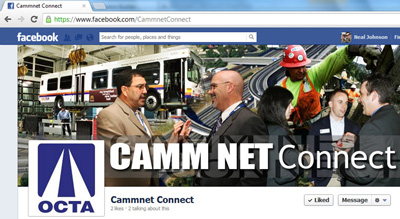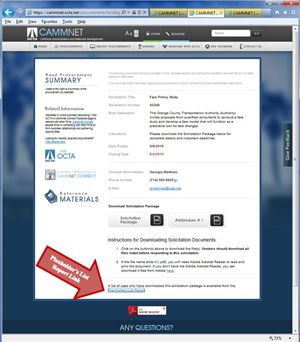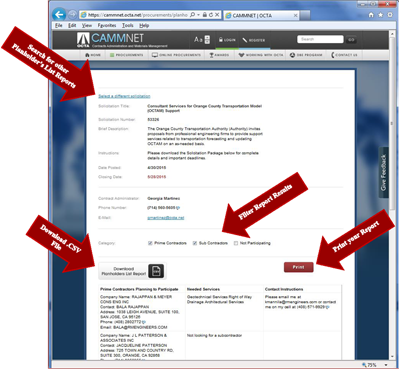How to Do Business with OCTA
Learn About OCTA
OCTA's Mission, Values, and Code of Conduct
OCTA Provides the following Public Services
OCTA Procurement
What Does OCTA Buy?
How Does OCTA Procure Goods and Services?
The Procurement Process
Procurement Thresholds
Procurement Types
Procurement Types for Formal Solicitations
IFB
RFP
Procurement Type for Informal & Micro Purchases
Common Solicitation Elements
Scope of Work
Cost and Price Forms
Proposed Agreement
Responding to an OCTA Procurement
Do Your Homework
CAMM NET Solicitations
Responding to Downloadable Solicitations
Responding to Online Submittal Solicitations
Responding to a Request for Proposals (RFP)
Why does OCTA use a Request for Proposals?
Preparing a Winning Proposal
Short-listed Proposals
Clarifications and Negotiations
The Value of Debriefings
OCTA’s Online Business Networking Tools
CAMM NET Connect
Planholder’s Lists
Unsolicited Proposals
What is an unsolicited proposal?
Why submit an unsolicited proposal?
What information is required in an unsolicited proposal?
Will the unsolicited proposal be kept confidential from public disclosure?
How will I know if OCTA receives my unsolicited proposal?
Will OCTA review every unsolicited proposal it receives?
What is the review process for an unsolicited proposal?
How does OCTA award a contract from an unsolicited proposal?
Public Auctions of Surplus Equipment




How to Do Business with OCTA
Learn About OCTA
The Orange County Transportation Authority (OCTA) is a public transportation agency, formed in 1991 through the consolidation of seven separate transportation agencies. A 17-member Board of Directors governs OCTA with the Caltrans District Director in an ex-officio capacity.
OCTA's Mission, Values, and Code of Conduct
Mission Statement: "To develop and deliver transportation solutions to enhance the quality of life and keep Orange County moving."
Core Values: In our daily activities we strive to uphold five core values:
- Integrity
- Can-Do Spirit
- Teamwork
- Customer Focus
- Communication
Code of Conduct: "The policies outlined in the Policy Manual are in place to ensure that goods and services are obtained timely, efficiently and economically, while adhering to principles of good public policy and practices and sound business judgment. The policies outlined in the Policy Manual have been established to foster free and open competition among vendors, consultants and contractors and incorporate the ethical standards set forth in the Authority’s Code of Conduct. The Policy Manual is organized to provide for a common understanding of the methods for initiating, developing, executing and administering third-party contracts within the parameters of Federal, State, Local and OCTA requirements."
OCTA Provides the following Public Services
OCTA Procurement
- The Contracts Administration and Materials Management Department (CAMM) is responsible for the purchase and sale of all goods, equipment and services within OCTA. All activities of a contractual nature with vendors, suppliers and contractors are coordinated through and conducted by CAMM.
Click here to view OCTA’s Procurement Policy Manual
What Does OCTA Buy?
- Professional Services
— Such as: consulting, financial, marketing - Architectural & Engineering Services
- Construction Services (Public Works)
- Equipment
— Such as: buses, replacement parts, computers etc. - Services and Supplies
— Such as: janitorial, printing, oil analysis etc.
How Does OCTA Procure Goods and Services?
- OCTA uses its award winning CAMM NET e-procurement website to post solicitations for public access.
- All vendors, suppliers, contractors and subcontractors interested in doing business with OCTA are required to register on the CAMM NET website.
- Registered vendors will receive solicitation emails, be able to download solicitation documents, and submit online bids depending on the type of solicitation.
- CAMM NET registration is free and easy.
Go to: https://cammnet.octa.net and register today.
The Procurement Process
Procurement Thresholds
- Formal Dollar Threshold: more than $100,000
- Informal Dollar Threshold: greater than $5,000 and less than $100,000
- Micro purchases: less than or equal to $5,000
- Non-competitive procedures
Procurement Types
Procurement Types for Formal Solicitations
- Invitation For Bids (IFB)
— Lowest Responsive & Responsible bid - Request for Proposals (RFP)
— Negotiated procurement
IFB
- Public opening of sealed bids
- Technical Specification
— Bids received must meet all Scope of Work and Technical Specification requirements - Awarded to the lowest responsive, responsible bidder
— Responsive bid includes:
- Complete bid forms
- Bid conforms to specifications
- Meets bond, licensing & insurance requirements
- Meets Disadvantaged Business Enterprise goal, if applicable
— Responsible bidder:
- Quality, experience, and capacity to perform work
RFP
- Sealed Proposals
- Performance/Functional Specification
— Firms are able to propose enhancements or innovations to the Scope of Work that do not materially deviate from the objectives or required content of the project. - Award — Highest scored proposal based on established evaluation criteria
— Price is only one of several evaluation criteria - Evaluation Committee
— Proposals are evaluated by an evaluation committee - Interviews, Site Visits, Demonstrations
— Not required for every procurement. - Responsive / Responsible Determination
— Responsive proposal includes:
— Responsible proposer:- Complete required forms
- Proposal meets project objectives
- Meets bond, licensing & insurance requirements
- Meets Disadvantaged Business Enterprise goal, if applicable
- Quality, experience, and capacity to perform work
Procurement Type for Informal & Micro Purchases
- Request for Quotations (RFQ)
— Awarded to lowest responsive & responsible bidder — CAMM NET Online Solicitation (Vendors complete and submit an online bid form) — CAMM NET Offline Solicitation (Vendors download solicitation document(s) and respond per instructions)
Common Solicitation Elements
Scope of Work
- Specifies the Products or Services OCTA is requesting
- Describes who, what, when, where, why and how the Product or Service is to be provided
- Specifies deliverables and timing
Cost and Price Forms
- Schedule of hourly rates or firm fixed price by task or item.
- Cost of other services
- Acknowledgment
- Effective days for offer
- Authorized signature required
Proposed Agreement
- Identifies terms and conditions
- Key articles:
— Payment and Invoicing — Term of Agreement — Insurance Requirements — Key Personnel — Prompt Payment, if applicable — DBE Requirements, if applicable
Responding to an OCTA Procurement
Do Your Homework
- Update your company’s CAMM NET Vendor Profile and the profile’s commodity codes to represent your company’s current capabilities
- Visit CAMM NET’s Future Procurements page to see and plan for future opportunities:
https://cammnet.octa.net/procurements/future/ - Search current and past Planholder’s List reports to find firms who may be interested in partnering with you on OCTA projects:
https://cammnet.octa.net/procurements/planholders-list-selection/ - Check out CAMM NET Connect to talk online to other Primes and/or Subcontractors
- Attend Pre-Bid and Pre-Proposal meetings (Not mandatory, but encouraged)
- Request a Debriefing if you were not awarded a contract to learn how you can improve upon future proposals.
- Sign up for a “Meet The Contract Administrator/Buyer” for online communication with OCTA procurement staff to discuss the products and services you can provide.
CAMM NET Solicitations
- There are two main types of CAMM NET Solicitations:
— Downloadable Solicitations
- Solicitation Requirements are in the IFB, RFP or RFQ solicitation document
- Bid/Proposal/Quote submittals are per instructions in the solicitation document.
Submittal is not online.
— Online submittal Solicitations
- Bids are submitted via an online RFQ or RFP form.
- Only issued for Solicitations less than $50,000
- Subject to OCTA’s Standard Terms and Conditions listed on the CAMM NET Website
Responding to Downloadable Solicitations
- Read and follow all IFB/RFP/RFQ instructions, Scope of Work and Solicitation requirements
- Attend Pre-proposal/Pre-bid meetings
- Submit any questions in writing by the date and methods specified in the solicitation
- Check the Website for all Solicitation Addendums before submitting your Bid or Proposal
- Acknowledge receipt of all Addendums on the Price/Bid Sheet
- Sign your Bid/Proposal/Quote.
- Complete and include all required forms
- Submit your Bid/Proposal/Quote on time. Submittals after the stated close date and time in the solicitation document will not be accepted
Responding to Online Submittal Solicitations
- Read the solicitation requirements on the online bid form.
- Email questions to the Contract Administrator/Buyer listed for that solicitation.
- You may modify your solicitation response anytime before the solicitation close date and time.
- Read all addendums listed on the online bid form before submitting your online Bid, Proposal or Quote.
- Print your bid acknowledgement page for your records.
- All submittals shall comply with OCTA’s Terms and Conditions
- Submit your Bid/Proposal/Quote before the solicitation close date and time
Responding to a Request for Proposals (RFP)
Why does OCTA use a Request for Proposals?
- The Request for Proposals (RFP) process allows OCTA to select the most advantageous proposal after considering all the proposal evaluation data available. Proposals are evaluated based on the stated evaluation criteria which always includes Price. A RFP is used to procure services in which the scope of work defines the expected outcome or performance rather than the precise specifications used in the Invitation for Bids (IFB) process.
The RFP process strives to identify the “Best Value” solution for OCTA.
Preparing a Winning Proposal
Can you do the work: Before developing your proposal, make sure you can comply with all the requirements and are capable of performing the work.
Ask Questions: If you are unsure about any procedural, regulatory, or technical solicitation requirements, submit your questions in accordance with the RFP instructions.
Explain why your solution is the best: A good proposal clearly articulates how it is aligned with the solicitation’s technical requirements and demonstrates it is the best solution for OCTA. Differentiate your proposal from your competitor’s.
Well written proposal: A good proposal is clearly written, concise, and error free. General marketing and sales literature may detract from your proposed solution. Your proposal should be creative, not appear as a “canned” response.
Proposal Order: The order your proposal contents should follow the order of the requirements in the RFP. This allows the evaluator to know that you have addressed all aspects of the RFP requirements.
Exceptions and Deviations: Including exceptions or deviations may cause your proposal from being considered.
Review your proposal: Review your proposal for typographical or grammatical errors, that forms are signed and included, and overall clarity before submitting it.
Complete and Sign your proposal: Complete and Sign all required forms.
Submit your proposal on Time: Proposals will not be accepted after the solicitation close date and time.
Short-listed Proposals
- Interviews: Interview date(s) are listed in the Request for Proposals solicitation package. Make sure all key personnel listed in your proposal will be available for interviews. Failure of a listed key personnel attending the interview could have a negative impact in your proposal’s evaluation.
- Site Visits: Depending on the nature of the project, a Site Visit may be required to determine the proposing firm’s capability of providing a required service.
- Demonstrations: A demonstration of a proposed product may be required. A typical example would be a demonstration of a firm’s proposed software.
Clarifications and Negotiations
- Proposal Clarifications: Be ready to respond in writing to clarification questions regarding your proposal.
- Discussions/Negotiations: If your firm is Short-listed, be prepared to enter into discussions and/or negotiations.
- Best and Final Offers: You may be asked for a “Best and Final” offer of your proposal.
The Value of Debriefings
The debriefing is a positive way for firms to learn how to improve their future proposals by learning about.
- What was positive in their proposal:
- How to improve the quality of their proposal:
- Deficiencies in their proposal:
- Deficiencies in their interview, site visit or demonstration:
OCTA’s Online Business Networking Tools
CAMM NET Connect

| — | CAMM NET Connect is a Facebook page created by The Orange County Transportation Authority (OCTA) which provides a tool for firms to build business and partnering relationships with other firms interested in OCTA business opportunities. Each wall post on the CAMM NET Connect Facebook page is directly related to an OCTA solicitation opportunity posted on the CAMM NET Website. You can network with other firms interested in a particular solicitation by commenting on a CAMM NET Connect wall post. |
| — | Learn more about CAMM NET Connect by going to: https://cammnet.octa.net/content/cammnet-connect/ |
Planholder’s Lists

| — | OCTA’s CAMM NET Planholder’s List Reports make it easy for Prime and Subcontractors to connect and develop partnering relationships for OCTA projects. |
| — | All companies downloading Invitation for Bids (IFB) or Request for Proposals (RFP) packages are required to complete a brief survey. The survey asks if you are planning on participating in submitting a bid or proposal as a prime or a subcontractor. Depending on the answer, you are provided an opportunity to indicate the services you either need or can provide and your contact information. |

| — | Vendors can also choose to receive update emails daily notifying them of any changes to the Planholder’s List Report. |
| — | Companies can also search for open and closed solicitation Planholder’s List Reports to help them start the teaming process well in advance of the next posted solicitation. |
| — | Learn more about CAMM NET Planholder’s List reports by going to: https://cammnet.octa.net/content/cammnet-connect/ |
Unsolicited Proposals
What is an unsolicited proposal?
- An unsolicited proposal is a written proposal that is submitted to OCTA for the purpose of developing a partnership and/or obtaining a contract that is not in response to a current, recent or anticipated request for proposals or bids. An unsolicited proposal should be for a unique and innovative concept, service or product. The unsolicited proposal should be prepared and submitted without supervision or direction by OCTA personnel.
Why submit an unsolicited proposal?
- An unsolicited proposal is a way to communicate innovative and unique ideas, concepts and solutions to OCTA. It is a method which allows OCTA to become aware of new technologies and processes which may in turn result in faster project delivery times and overall greater benefits to the citizens of Orange County.
What information is required in an unsolicited proposal?
- For an unsolicited proposal to be considered by OCTA, it must be in writing and provide sufficient details for OCTA to determine if the proposal supports OCTA’s mission, goals and objectives. The proposal must include the following basic information: general information about the proposer(s), a technical proposal and a financial proposal. The detail information necessary to be submitted can be found on https://cammnet.octa.net.
Will the unsolicited proposal be kept confidential from public disclosure?
- All submissions to OCTA, including an unsolicited proposals, are subject to the California Public Records Act (California Government Code section 6250 et. seq.). Proposers must clearly mark each page of the unsolicited proposal that contains confidential or proprietary information, and trade secrets. Financial records and documents must also be marked as confidential to be protected from public disclosure. Concepts and ideas are not considered proprietary.
How will I know if OCTA receives my unsolicited proposal?
- All unsolicited proposals must be received by OCTA’s Contracts Administration and Materials Management Department (CAMM). CAMM will notify the proposer in writing that OCTA has received the proposal and indicate an intent to review it for a further recommendation. This notice should be sent out within ten (10) days from receiving the unsolicited proposal.
Will OCTA review every unsolicited proposal it receives?
- OCTA is not required to perform a comprehensive evaluation of an unsolicited proposal that it receives if the proposal is unrelated to the OCTA’s mission, does not offer a measurable benefit to the OCTA, does not include sufficient information to support a comprehensive evaluation, or is otherwise not in the best interest of the OCTA
What is the review process for an unsolicited proposal?
- There is a two-step process for reviewing unsolicited proposals.
- Within sixty (60) days from receipt of the unsolicited proposal, CAMM will review the proposal and determine whether that proposal meets the requirements of an unsolicited proposals.
If the proposal is considered a valid unsolicited proposal with value and benefit to the OCTA, a review committee will be convened to assess the proposal in greater detail and ultimately, make a recommendation to the Chief Executive Officer.
If the OCTA decides not to consider the unsolicited proposal beyond the initial review, a written notification will be sent to the proposer. - The review committee will examine the technical and financial aspects of the proposal. The committee has the ability to request additional technical and financial data which supports the information provided in the proposal. The committee can invite the proposer(s) to a meeting to discuss the unsolicited proposal or to request a demonstration of the project being proposed. The committee can also request any additional information or details necessary to answer any questions raised by the review committee.
Step 1 – Initial Conceptual Review:
How does OCTA award a contract from an unsolicited proposal?
- At the conclusion of the evaluation, the review committee will make a recommendation to proceed or not to proceed. The decision will be sent to the Chief Executive Officer for review and concurrence.
- The acceptance and review of an unsolicited proposal does not bind the OCTA into awarding a contract to the proposer. If the proposal offers a product or service that contains proprietary information, data, or concepts or is truly a unique one-of-a-kind item, then OCTA, following its existing policies and procedures, will proceed with a sole source agreement.
- If the unsolicited proposal does not meet the criteria for a sole source contract award, OCTA will seek to obtain full and open competition by following the procedure outlined in OCTA's Unsolicited Proposal Policy.
Public Auctions of Surplus Equipment
General Auction
Public Surplus
- OCTA Employee Surplus Sale Exclusions:
- Authority Board of Directors
- Authority Employees involved in:
- Original procurement
- Determining the item as surplus
- Disposal of the item
- All OCTA Contracts Administration and Materials Management Department employees
- Spouses or dependents of any of the above

















